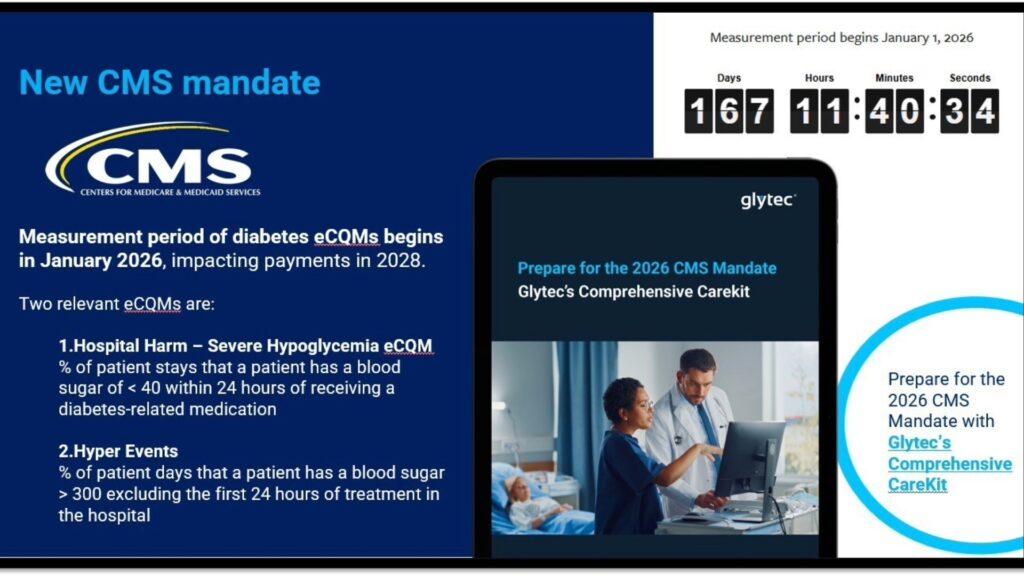As Medicare prepares to implement mandatory reporting requirements for blood glucose management in hospitals, healthcare facilities face a tight deadline to establish systems for tracking severe glycemic events. Glytec’s FDA-cleared Glucommander platform is among the technologies available to help hospitals meet the upcoming Centers for Medicare & Medicaid Services (CMS) mandate on inpatient glycemic control reporting, which begins January 1, 2026.
Key Points
- CMS will require hospitals to report severe blood glucose events as electronic clinical quality measures (eCQMs) starting January 2026, marking a shift in how Medicare approaches inpatient diabetes care oversight.
- Glytec announced that its FDA-cleared Glucommander platform is designed to help hospitals meet the new requirements through EHR-integrated dashboards and automated reporting capabilities.
- Hospitals that fail to meet the new reporting requirements face potential Medicare reimbursement reductions beginning in fiscal year 2028, adding financial pressure to an already complex clinical challenge.
- The mandate addresses a significant gap in hospital preparedness, as many facilities currently lack automated systems to track glucose management metrics despite the high prevalence of diabetes-related complications.
- The new requirements reflect growing federal focus on reducing preventable hospital complications and their associated costs, particularly as diabetes-related adverse events continue to burden the healthcare system.
With over 2 million hypoglycemia-related hospital events annually contributing to $8 billion in healthcare costs, the CMS mandate creates new pressure for systematic tracking.
The Data
- Mandatory reporting of severe blood glucose events begins January 1, 2026.
- CMS defines severe hypoglycemia as blood glucose below 40 mg/dL and severe hyperglycemia as blood glucose above 300 mg/dL.
- More than one-third of hospitalized patients require insulin therapy; over 2 million patients experience hypoglycemia-related adverse events annually, contributing to over $8 billion in healthcare costs.
- Glytec cites statistics indicating nearly one-third of hospitals don’t track glucose metrics and 59% lack automated collection methods. However, this data comes from a 2010 study.
- The healthcare tech company noted that some institutions have developed internal solutions but suggested that these approaches may fall short.
- Glytec platform metrics: Used by over 400 hospitals, built on 100+ patents, 100 clinical publications, 16 years of experience, processes 50+ billion data points.
Industry Context
CMS is creating focus and awareness around inpatient diabetes care. This will help drive improved patient care and patient safety, but hospitals also have revenue to gain via reduced length of stay and cost avoidance through reduced hypoglycemia, lower testing costs, and improved workflows. Glytec’s platform is purpose-built to lead hospitals through this transition safely and to continue to innovate around diabetes workflows to drive better patient care and overall economics for healthcare stakeholders.
Patrick Cua, CEO of Glytec
The new reporting requirements address the increasing prevalence of diabetes and its complications within hospital settings. More than one-third of hospitalized patients require insulin therapy to manage elevated blood glucose levels during their stay. Each year, hypoglycemia-related events are associated with increased length of stay and higher readmission rates, placing significant burden on healthcare systems and payors.
Glytec positions its FDA-cleared platform as an alternative to in-house insulin calculators, stating that internal solutions may lack clinical validation, scalability, and the rigor of FDA-cleared solutions. The platform integrates with electronic medical records and provides clinical decision support, workflow alerts, and patient monitoring capabilities.
As hospitals approach the CMS deadline, they must evaluate whether to implement commercial solutions or develop internal systems for glycemic event tracking and reporting to avoid potential Medicare reimbursement reductions.



